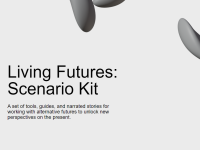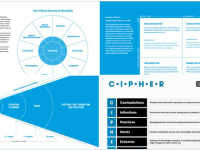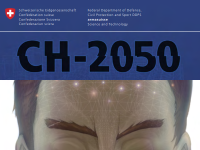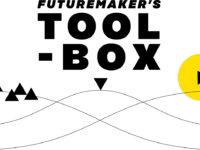Global: Anticipatory Innovation & Foresight
Editor’s note: This guest blog was written by Katju Holkeri, Head of Unit for Governance Policy in The Public Governance Department in the Finnish Ministry of Finance. This post was written following a February 2021 collaboration session between three OECD teams to join up intersecting work on trust, civic space, and anticipatory innovation governance in Finland. Anticipating the trust of citizens is not easy. What is possible for us in Finland however is to strengthen...
Living Futures: Scenario Kit is a design tool for understanding, discussing, and shaping the future. It consists of four alternative versions of year 2050 explored through narrated stories from future citizens, themed analyses, and other media files, as well as a set of design tools that puts the scenarios to work. The kit can be used to future proof business models, develop new strategy, and understand and discuss important trends and developments in the present.
The kit is flexible and can be…
After Government After Shock we invited event hosts to share with us recordings of their events, any write-ups of their event or some after-the-event reflections on their event and what they learnt. This blog post provides an easy reference point to help interested people navigate between these. You can also find these materials on the relevant event listing on the Government After Shock site. Event recordings We have created a YouTube playlist where you can find a...
New Year’s resolutions are so frequently unfulfilled that it has become a cliché to cynically write them off as futile. We create them in the hopes of creating innovation in our lives, but often they fall short of the novel, implemented, impactful action that innovation implies. Why does this happen? Many would argue it’s to do with the resolutions themselves—their scope, ambition, execution, and definition. A quick internet search will find you countless advice articles...
A summary report of the Government After Shock conference, which presented an opportunity for collective learning, thinking critically about the implications of the COVID-19 crisis and exploring how to steer government and society toward preferred futures rather than reverting to the status-quo.
This resource contains 11 frameworks and methods used by the Future Today Institute, including:
The FTI Forecasting Model
How To Think About Time
Identifying Key Stakeholders
Assumptions vs Knowledge
CIPHER
Axes of Uncertainty
Scenario Planning Guide and Templates
Four Laws of Tech Trends
11 Macro Sources of Disruption
Velocity of Change: Calculation Guide
Futures States
Each resource includes guidance and instructions on its use.
The transition game is an adapted version of “Le jeu de la transition” developed by the French Think Tank FING (Fondation Internet Nouvelle Génération) and adapted to a national defence environment, covering topical areas such as cyber and information warfare, man-machine teaming, and situational awareness and reconnaissance.
It guides groups through several steps:
1) Think about how different context factors and "internal tensions" shape today's state (ordering principles, norms,…
This toolbox is a guide for shaping the future and developing organisational operations. It guides users through how to build an organisation’s future capability to ready it to deal with new phenomena. It guides users through all the steps of building a vision and for viewing, interpreting or shaping futures. It contains three phases: Trends and Signals, Interpretation and choices, and Shaping futures. Each tool includes step-by-step guidance and downloadable resources.
Our Futures is a game for discovering new ways of engaging the public in thinking about alternative futures. The basic premise of Our Futures is that participants are randomly offered a series of constraints by drawing cards and rolling a dice, which serve as a primer for imagining a participatory futures activity. The game is played either with a group of individuals competing against each other or in teams in 30-75 minutes. The game has three different gameplay models of varying scope and…
The Scenario Exploration System was developed to facilitate the application of futures thinking to policy-making originally geared at engaging EU policy-makers with foresight scenarios very easily.
The tool operates as a multi-role board game that makes participants naturally grasp complex opportunities and constraints in a future-oriented perspective. Never before had a tool been able to facilitate the uptake of foresight for policy-making and systemic thinking to such an extent.










